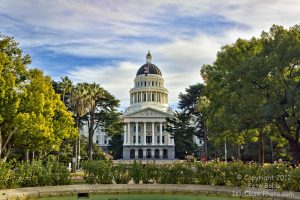As the weather turns warm and sunny, the Legislative Session is in full swing, working on a yearly process that pushes thousands of bills through the legislative process. Most recently, the Assembly and Senate held a number of floor sessions, where members voted on every bill before them on whether it should pass to the next house. These votes just concluded on June 2nd, leaving the aftermath of determining what ultimately passed. The Coalition for Clean Air saw a number of our priority bills pass and fail, demonstrating how unpredictable this process can be. As we continue our work on supporting bills that improve air quality, reduce climate change, and contribute to equity, we will share the stories of what happened to some of our priority bills.
Climate Accountability: SB 253 and SB 261
SB 253 (Wiener) and SB 261 (Stern) set strong standards for corporate accountability in response to climate change. SB 253 requires the most profitable US-based corporations that do business in California to publicly disclose their full GHG emissions footprint. Similarly, SB 261 would require companies with more than 500,000 in annual revenue to report their climate-related financial risk and adopted measures to reduce that risk to the California Air Resources Board (CARB). These bills would improve transparency, data collection, and accountability around GHG emissions produced by corporations and the measures those companies are taking to reduce and mitigate climate change impacts.
Despite the strong opposition from the agriculture, pharmaceutical, construction, building, and manufacturing sectors, the two bills were able to pass through the Senate. Though the bills have a long road ahead, CCA and our allies are committed to getting them through the finish line to ensure that corporations remain accountable for the climate change impacts they create.
The Sad Tale of AB 1525:
The idea behind AB 1525 (Bonta) was born after the success of SB 535 (De Leon, 2012) and AB 1550 (Gomez, 2016) which set targets for how Greenhouse Gas Reduction Fund (GGRF) funding was to be allocated to benefit disadvantaged communities and low-income populations. The Coalition for Clean Air had originally sponsored and supported those bills, so when our allies at the Greenlining Institute proposed a bill that would require that 60% of eligible state and federal transportation dollars be invested in priority populations, we were happy to support them. This bill would have prioritized transportation investments in the communities that need them the most, which could address the longer, less reliable commutes, unsafe transportation infrastructure, traffic fatalities, and transportation-related air pollution that these communities face. Despite strong support from equity and environmental organizations, the bill received opposition from the building and construction industry at the last minute and was, thus, held in the Appropriations Committee.
AB 6 and 7: A Step Forward and a Step Aside
Coalition for Clean Air has been working closely with Assembly Member Friedman’s office to pass progressive transportation legislation that takes another look at how we are prioritizing potential transportation projects. Thus, we strongly support AB 7 (Friedman) to codify a number of state and federal principles, namely from the Climate Action Plan for Transportation Infrastructure (CAPTI), Infrastructure Investment and Jobs Act (IIJA), and Justice40, that ensure we are promoting equitable and sustainable transportation projects. The bill also tasks California transportation agencies to analyze and report our progress in achieving those principles. We will continue working to move this bill forward now that it has passed the first floor vote.
AB 6 (Friedman) is taking a different path. This bill came about following a long discussion with all stakeholders at the table and initially proposed to require CARB to review and approve the methodology that Metropolitan Planning Organizations (MPOs) were using to estimate GHG emissions. However, given the resistance from interests who favor road construction, another idea floated to the surface: to have AB 6 establish guidelines for how regional agencies can set up VMT mitigation banks. A VMT mitigation bank, somewhat similar to emission offsets, would allow project developers to invest in VMT mitigation projects if their own project is projected to increase VMT. While this idea sounds good on paper, the Coalition for Clean Air and our allies are concerned that it could allow developers to simply pay a fee to build bad projects that contribute to air pollution and climate change. Due to the complicated nature of this topic, AB 6 has become a 2-year bill, allowing us to continue the discussion on the pros and cons of VMT mitigation banks.
The Battle for Air Quality Funding: AB 241 and SB 84
The Coalition for Clean Air has been strongly advocating for the passage of AB 241 (Reyes) and SB 84 (Gonzalez). These two bills would extend the Clean Transportation Program (CTP), the Air Quality Improvement Program (AQIP), and the Enhanced Fleet Modernization Program (EFMP) programs, which are funded by vehicle registration fees, for an additional 12 years. These programs help reduce smog-forming and carcinogenic air pollutants and retire old, polluting vehicles in our most burdened communities. In particular, the legislation would require that half of the Clean Transportation Program dollars have to go towards directly benefiting disadvantaged and low-income communities.
Both bills have stalled for now, due to the opposition from the hydrogen industry, which is looking for a special-interest earmark for funding to build hydrogen fueling stations. While most bills are required to pass the first house by June 2nd, as urgency measures these bills have more time, and could also pass as part of a budget bill.
As we continue into the legislative session, we will need all hands on deck in order to pass these air quality and climate priorities. If you would like to help us in getting these priorities passed, please consider contacting your representative to voice your support for the bills (Click here to find your representative). We will continue working on getting key legislation onto the Governor’s desk to ensure that California is leading the nation in promoting healthy air quality and reducing the impacts of climate change.








